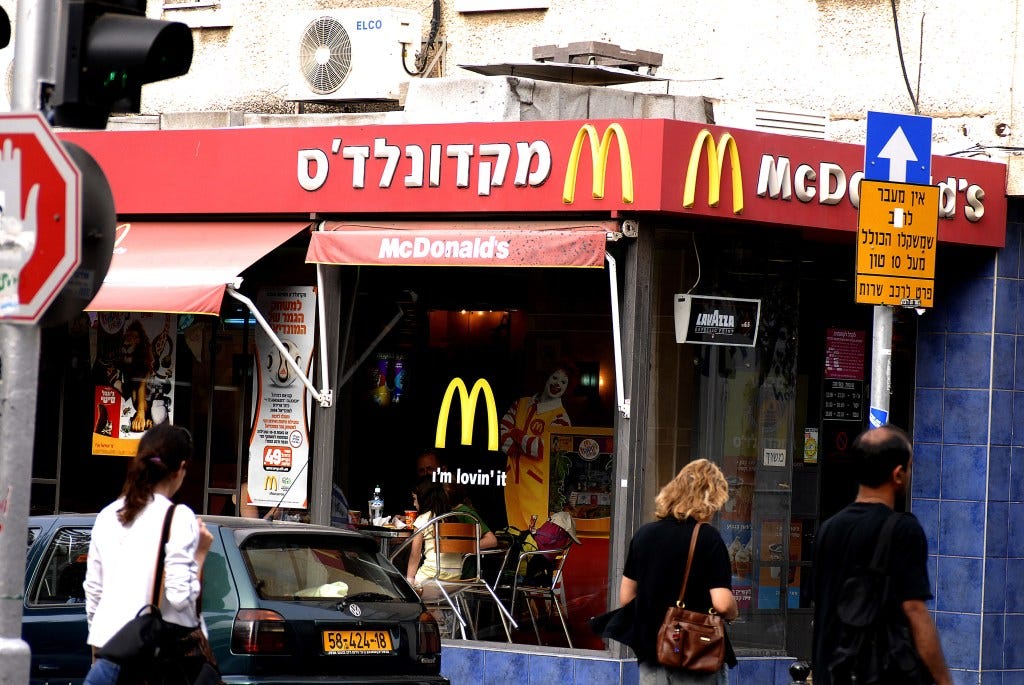McDonald in Middle-East: Collateral Damage of Israel-Hamas Conflict

Introduction: When Burgers Meet Geopolitics
In a wholly unexpected and unforeseen turn of events, McDonald's—the epitome of American fast-food culture—now finds itself embroiled in the Israel-Hamas conflict. This article offers a cursory glance into the intricate and complicated dynamics that have caused this global brand to inadvertently become a new flashpoint between two already feuding parties.
The Catalyst: Free Meals and a Vortex of Controversy
It began innocently enough when Alonyal Limited, which runs a McDonald’s franchise in Israel, announced it would offer free meals to Israeli soldiers and hospitals. This seemingly goodwill gesture snowballed into a regional uproar, prompting McDonald's outlets in other Middle Eastern countries to disassociate themselves from the Israeli franchise’s decision.
Political Distancing: Franchises Take a Stand
In a quick response, McDonald’s franchises in countries like Turkey, Egypt, Jordan, and Lebanon issued statements distancing themselves from the Israeli actions. Al Maousherji Catering Company, the operator of McDonald’s Kuwait, made it clear that the Israeli franchise's decision was a “private and individual act," underscoring the divide within the McDonald’s family.
Acts of Vandalism: The Violent Backlash
In the aftermath of a devastating airstrike on a Gaza hospital, McDonald's outlets in Turkey, Lebanon, and Egypt experienced vandalism. These incidents underscore that for many, McDonald's is not just a fast-food chain; it serves as a potent symbol of America. This high profile makes it susceptible to public outrage and acts of damage and defacement, especially when fueled by perceptions of U.S.-backed Israeli actions.
The Corporate Angle: Damage Control and Reputational Risks
In light of these events, the McDonald’s Corporation stated that their top priority was ensuring the safety of their employees on the ground. However, this has not prevented calls for boycotts across social media platforms in the Middle East, further complicating the situation for the American fast-food giant.
The Voice of Social Media: Amplifying the Crisis
Social media influencers and popular figures like TikTok star Ahmad Nagy and Egyptian talk show host Amr Adib have used their platforms to debate the issue. Nagy, urging for a boycott, and Adib, appealing for pragmatism, exemplify the sharply divided opinions on the subject.
Economic Concerns: Jobs and Livelihoods
Amid the clamor for boycotts, the local economic impact has also been brought to the forefront. The franchise in Egypt alone provides more than 40,000 jobs, thus raising ethical questions about the implications of a successful boycott.
The Historical Context: Echoes of Past Boycotts
The current situation is reminiscent of Arab boycotts of American brands during the early 2000s and the Second Palestinian Intifada. This suggests that McDonald’s precarious position is part of a recurring pattern, where symbols of American culture become proxies in larger geopolitical struggles.
Conclusion: An Uncertain Road Ahead
As the Israel-Hamas conflict escalates, McDonald’s precarious position in the Middle East is a compelling case study of how global brands can become unwitting participants in geopolitical conflicts. With franchisees, mostly owned by local companies and businessmen, trying to navigate the stormy waters of public opinion and corporate responsibility, the future remains uncertain for McDonald’s in the region.
This situation encapsulates the intricate relationships between politics, business, and public sentiment. It also serves as a reminder of how easily corporations can become enmeshed in geopolitical conflicts, facing not just financial but also ethical dilemmas.



